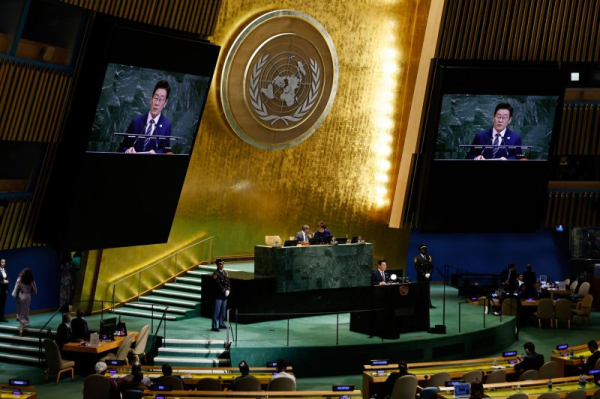

South Korea will again co-sponsor a United Nations resolution condemning North Korea’s human rights violations, a document showed Wednesday. Questions had emerged whether President Lee Jae Myung, seen here addressing the U.N. General Assembly, would support the resolution amid efforts to improve relations with Pyongyang. Photo by Peter Foley/UPI | License Photo
South Korea will again co-sponsor a United Nations resolution condemning North Korea’s human rights violations, its Foreign Ministry confirmed Wednesday, amid speculation that Seoul might withhold support in an effort to improve relations with Pyongyang.
The draft resolution, introduced last week to the Third Committee of the U.N. General Assembly, “condemns in the strongest terms the long-standing and ongoing systematic, widespread and gross violations of human rights in and by the Democratic People’s Republic of Korea, including those that may amount to crimes against humanity.”
The Democratic People’s Republic of Korea is the official name of North Korea.
The resolution calls on Pyongyang to “respect, protect and fulfill all human rights and fundamental freedoms” and to “immediately close the political prison camps and release all political prisoners unconditionally.”
South Korea was among the 41 U.N. member states that co-sponsored the resolution, maintaining the position of former President Yoon Suk Yeol’s conservative government.
The Foreign Ministry said Wednesday that Seoul’s approach to North Korean human rights would remain a matter of principle.
“Our government, recognizing the importance of substantially improving the human rights of North Korean citizens and committed to continuing cooperation with the international community to this end, has participated as a co-sponsor of this resolution,” the ministry said in a statement sent to UPI.
The move comes as Seoul weighs how to balance engagement with Pyongyang against pressure to address its human rights record. President Lee Jae Myung has made efforts to improve relations between the two Koreas since taking office in June, with conciliatory gestures such as dismantling propaganda loudspeakers and restricting activist groups from floating balloons carrying information across the border.
He has expressed support for renewed diplomacy between U.S. President Donald Trump and North Korean leader Kim Jong Un, saying last month he hoped Trump would have a chance to play the role of “peacemaker” on the Korean Peninsula.
South Korea co-sponsored the resolution from 2008 through 2018, but withdrew during a period of inter-Korean detente between 2019 and 2022 under then-President Moon Jae-in.
In late October, Human Rights Watch and 20 other groups sent an open letter urging Lee’s government to back the resolution, warning that recent domestic policy shifts “signal a troubling move away from support for the victims of North Korea’s repression.”
The rights watchdog praised Seoul for its support on Wednesday.
“South Korea’s co-sponsorship showcases leadership as a democracy upholding law and dignity,” Lina Yoon, senior Korea researcher at Human Rights Watch, told UPI.
“Seoul should sustain it, by supporting U.N. accountability, protecting North Korean escapees, expanding information flows and pressing Pyongyang along with other governments for reforms to end repression,” she said.
The United States was not among the sponsoring countries. In February, President Trump signed an executive order withdrawing the United States from the U.N. Human Rights Council, reinstating the position he adopted during his previous term.
North Korea has long rejected such resolutions as hostile acts, accusing the United Nations and Western powers of using human rights as a pretext to undermine its government.
Following the adoption of last year’s measure, Pyongyang’s Foreign Ministry denounced it as a “politically motivated provocation.”
A September report by the U.N. Human Rights Office found that North Korea’s human rights situation “has not improved over the past decade and, in many instances, has degraded,” citing worsening food shortages, widespread forced labor and tight restrictions on movement and expression.
The U.N. General Assembly is expected to vote on the resolution in December.